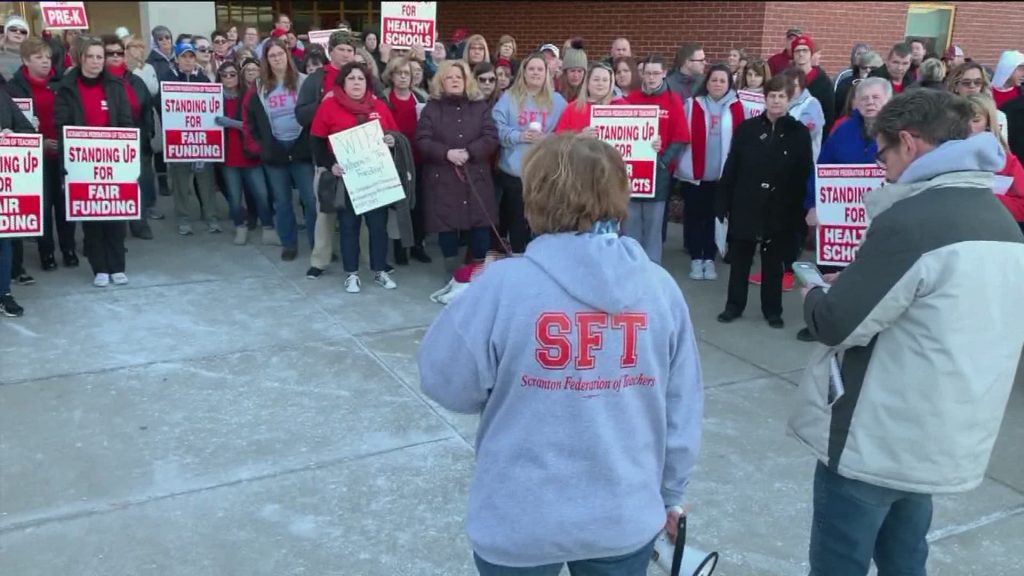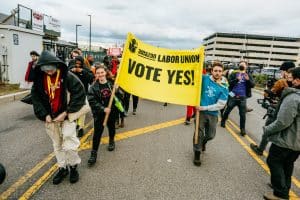After working four years without a contract, 800 teachers and paraprofessionals in the Scranton Federation of Teachers are preparing to strike. If an agreement isn’t reached between the union and district management, a strike would start November 3.
The SFT’s leadership made the announcement about striking after four years of working without a contract or a pay raise — and just after the Scranton School Board approved a budget that does not include any pay raise for teachers. When annual inflation is factored in, stagnating wages effectively mean teachers have to take a pay cut each year. And inflation has been surging this year, now standing at 5.4 percent.
Meanwhile, Scranton teachers went back into classrooms in the middle of the Covid-19 pandemic, which has already claimed more than 700,000 lives in the U.S. alone.
School district managers are playing coy. They say they are indeed offering pay raises to teachers. But without a budget approving a pay increase, their plan would mean cutting funds from someplace else — a calculated move to turn parents against the union and split union members themselves in a choice between higher pay and funding other aspects of Scranton’s schools.
By preparing to strike, the SFT is also fighting years of austerity that have meant less services for students and more crowded classrooms — at a time when more crowded rooms means more danger of illness from Covid-19 for both teachers and students. They are demanding the reinstatement of key aspects of the schools that had been cut, from libraries to music classes.
The Importance of Rank-and-File Action
Judging from the past few years — and the refusal of the school district managers to concede — it seems likely that there will be no major concessions from the bosses without a strike. But it will take bottom-up, rank-and-file organizing to prepare for one that can win major concessions from the school district. Union leaders can’t win a strike; only the rank and file can.
One reason is the need to mobilize as widely as possible inside the union to stop scabs from breaking a strike — either union members who could be tempted to cross a picket or others. Stopping scabs means having strong picket lines that aren’t afraid to intimidate and shut down the scabs trying to get through and the cops who are there to help them. Union leaders across the country have all too often been very weak in the face of scabs in the last 40 years; only rank and filers can make a strong picket and enforce it.
Another reason is the importance of winning parents’ support. Winning them over to the strike will take mass mobilization of union members, since the school district bosses and the local papers will be filled with union-busting slogans to turn public support against the union.
And more than this: rank and filers are absolutely crucial for winning active support from other sectors of the working class.
That’s because more solidarity means bigger and potentially more powerful picket lines. And since the district might try to force teaching online in the event of a strike — which would make it easier for scabs — linking with other workers and building towards solidarity strikes, would give the strikers much more power to win their demands.
Solidarity strikes would mean strengthening the teachers’ union and workers generally. They link the teachers’ fight with a power to disrupt the wider economy — which would put more pressure on the politicians and bosses to settle, for fear of emboldening the working class even further.
Solidarity strikes have been rare in the U.S. in recent years. This is in part because these types of strikes are illegal. The fact that they’re illegal is only proof of their power, and the fear that both Democrats and Republicans, as well as the bosses, have of them. The fact remains that a strike that’s powerful enough — wide and committed enough — to win doesn’t need to worry about legality, since it forces the bosses and their politicians to make concessions. Building toward such actions would have to come from the rank and file themselves, reaching across unions.
Ultimately, rank-and-file organizing is crucial because it empowers union members in the widest-possible way, making a fight against bosses each member’s struggle. It’s the way to put decisions and power directly into the hands of the workers themselves — and that opens up the possibility for the kinds of power and solidarity that our union leaders will often balk at.
But all this points to the idea that mass union democracy is key. Preparing strong pickets, approaching the ranks of other unions for solidarity actions, winning parent support on the widest basis — this will require real, democratic venues — assemblies for teachers and paraprofessionals to organize themselves, coordinate, reach out to others, and mass mobilize.
“Without our brain and muscle not a single wheel can turn” — and not a single class can be taught. A strike seems to be on the horizon for the SFT. And with it comes a chance to build broader worker power — and help turn Striketober into Strikevember.










